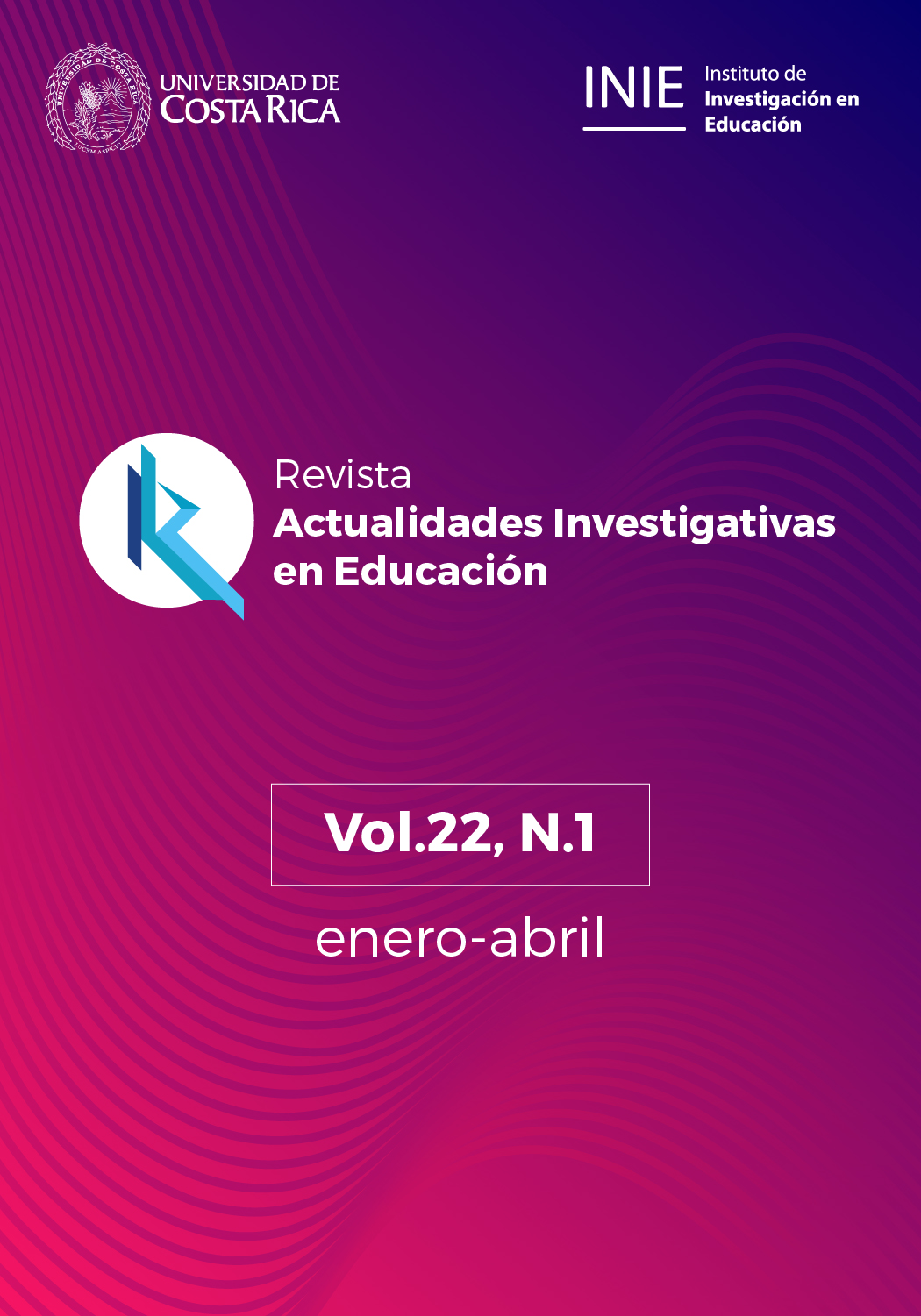Abstract
The theory of career development emphasizes the understanding of the process carried out by the person to build their personal and professional identity throughout life. However, in the professional practice of Counseling, practicing such exploration requires delving into their experiences, interactions and activities carried out, as well as the meanings given to them. According to the above, this article aims to operationalize a qualitative exploration instrument, where the career development of people is represented, through didactic and visual support through a graph. In this way, the intention of the instrument will be to favor dialogue in the intervention process, as well as the exploration of elements such as: the perception of significant experiences; the personal resources and support available to the person, that is to say, it will help to propose the strategy to be followed in the intervention process. It should be noted that the instrument was developed in Costa Rica and subjected to qualitative validation in 2021, with the help of a panel of experts in Counseling, focused on determining suggestions for improvement; utility of the instrument; feasibility and possible criteria for interpretation. As a result, the expert panel pointed out the feasibility of applying the instrument, the ease of understanding that -from a holistic and comprehensive perspective- provides information to build the profile of the targeted person and thus base the rest of the process of intervention. In short, it is concluded that the application of said exploration instrument will facilitate the guiding action, in addition to being a significant contribution in the professional practice of Counseling and a tool that arises from the vision of the discipline in the particular Costa Rican context.
References
Anderson, Mary., Goodman, Jean., y Schlossberg, Nancy (2012) Counseling Adults in transitions. Linking Schlossberg theory with practice in adverse world (4th ed.). Spencer Publishing Company.
Bisquerra, Rafael. (2016). Orígenes y desarrollo de la orientación pedagógica. Madrid, España: Narcea Ediciones. Recuperado de https://elibro-net.ezproxy.sibdi.ucr.ac.cr/es/ereader/sibdi/45930?page=40
Chia de la Rosa, Paula. (2018) Trayectoria, motivación y adaptabilidad de la carrera en los estudiantes de máster de educación en la Universidad de Sevilla (Tesis de Grado en Pedagogía). Universidad de Sevilla, Sevilla, España. https://idus.us.es/bitstream/handle/11441/81800/174_47556657.pdf?sequence=1&isAllowed=y
Falcón Carolina., y Arraiz Ana. (2017). Construcción eficiente y sostenible de la carrera: el portafolio como recurso de orientación universitaria. REOP - Revista Española De Orientación y Psicopedagogía, 28(2), 8–29. https://doi.org/10.5944/reop.vol.28.num.2.2017.20116
Freudenthal, Erika. (2017). De-construcción, re-construcción, co-construcción de la carrera profesional para un contexto no-occidental. Revista de Investigacion Psicologica, (17), 105-116. http://www.scielo.org.bo/scielo.php?script=sci_arttext&pid=S2223-30322017000100007
Fuster, Doris. (2019). Investigación cualitativa: Método fenomenológico hermenéutico. Revista Propósitos y Representaciones 7(1), 201-229. Doi http://dx.doi.org/10.20511/pyr2019.v7n1.267
Guichard, Jean. (2002). Problemáticas y finalidades de la orientación profesional. Revista Europea en Formación Profesional, (26), 5-2.
Guichard, Jean. (2007). Life-long self-construction: A core issue of vocational psychology in a globalized world. In J. Guichard (Convener), Vocational guidance and diversity across the world. Invited symposium presented at IAEVG international conference, Padova, Italy, September 4–6.
Kapanadze, Maria. (2018) Moral identity and carrer construction: implications for theory intervention and research. Example of people in recovery from substance use disorders (Doctoral Thesis). Universitat de Girona, Girona, España. http://hdl.handle.net/10803/663725
Kvale, Steinar. (2011). Doing Interview. Ediciones Morata.
Lewthwaite, Sara., y Nind, Melanie. (2016). Teaching Research Methods in the Social Sciences: Expert Perspectives on Pedagogy and Practice. British Journal of Educational Studies, 64(4), 413-430.
López, Inmaculada., Blanco, Ascension., Pagán, Rosa., Gazapo, Bienvenido., Arana, José., Pizarro Ester., y Martínez, Beatriz. (2014). Estudio cualitativo sobre tutoría universitaria a través del método del panel de expertos. Higher Learning Research Communications, 4(1), 73-90. https://bit.ly/3yvCIIk
McMahon, Mary. (2014). New Trends in Theory Development in Career Psychology. En Gideon Arulmani, Anuradha Bakshi, Frederick Leong and A. Watts (Eds.), Handbook of Career Development. International Perspectives (pp. 13-28). Springer.
McMahon, Mary, y Patton, Wendy. (2019). The Systems Theory Framework: A Systems Map for Career Theory, Research and Practice. In James A. Athanasou, y Harsha Perera (Eds.), Internatinal Handbook Carrer Guidance (pp. 97-114). Swizterland: Springer Science.
Ribeiro, Marcelo. (2013). Reflexiones epistemológicas para la orientación profesional en América Latina: una propuesta desde el Construccionismo Social. Revista Mexicana de Orientación, 24(10), 2-10.
Robles, Pilar., y Rojas, Manuela. (2015). La validación por juicio de expertos: dos investigaciones cualitativas en Lingüística aplicada. Revista Nebrija de Lingüistica, (18). https://www.nebrija.com/revista-linguistica/la-validacion-por-juicio-de-expertos-dos-investigaciones-cualitativas-en-linguistica-aplicada.html
Sánchez, Fabio. (2019). Fundamentos epistémicos de la investigación cualitativa y cuantitativa: consensos y disensos. Revista Digital de Investigación en Docencia Universitaria, 13(1), 102-122. doi https://doi.org/10.19083/ridu.2019.644
Sánchez, María Fe. (2017). Orientación para el desarrollo profesional. San José, Costa Rica: Editorial de la Universidad Estatal a Distancia. https://elibro-net.ezproxy.sibdi.ucr.ac.cr/es/ereader/sibdi/48917?page=64
Santos Ofelia., Hidalgo Cristian., y Arreaga, Carlos. (2017). La etapa final del análisis y la redacción del informe de investigación cualitativo. En Carlos Escudero y Liliana Cortéz, Técnicas y Métodos Cualitativos en la Investigación Científica (pp. 90-104). Ecuador: Editorial UTCHMAN.
Savickas, Mark. (2015). Life Desing Counseling Manual. Mark Savickas. http://www.vocopher.com/LifeDesign/LifeDesign.pdf
Savickas, Mark., Nota, Laura., Rossier, Jerome., Dauwalder, Jean., Duarte, María., Guichard, Jean., Soresi, Salvatore., Esbroeck, Raoul. and Van Vianen, Annelies. (2009). Construir su vida (Life Designing). Un paradigma para la Orientación. Journal of Vocational Behavior, 75(3), 239-250 Trad. Diana Aisenson y Gabriela Aisenson. https://researchportal.vub.be/en/publications/life-designing-a-paradigm-for-career-construction-in-the-21st-cen
Super, Donald. (1969). Vocational Development Theory: Persons, Positions and Processes. The Counseling Psychologist, 1(1), 2-9.







